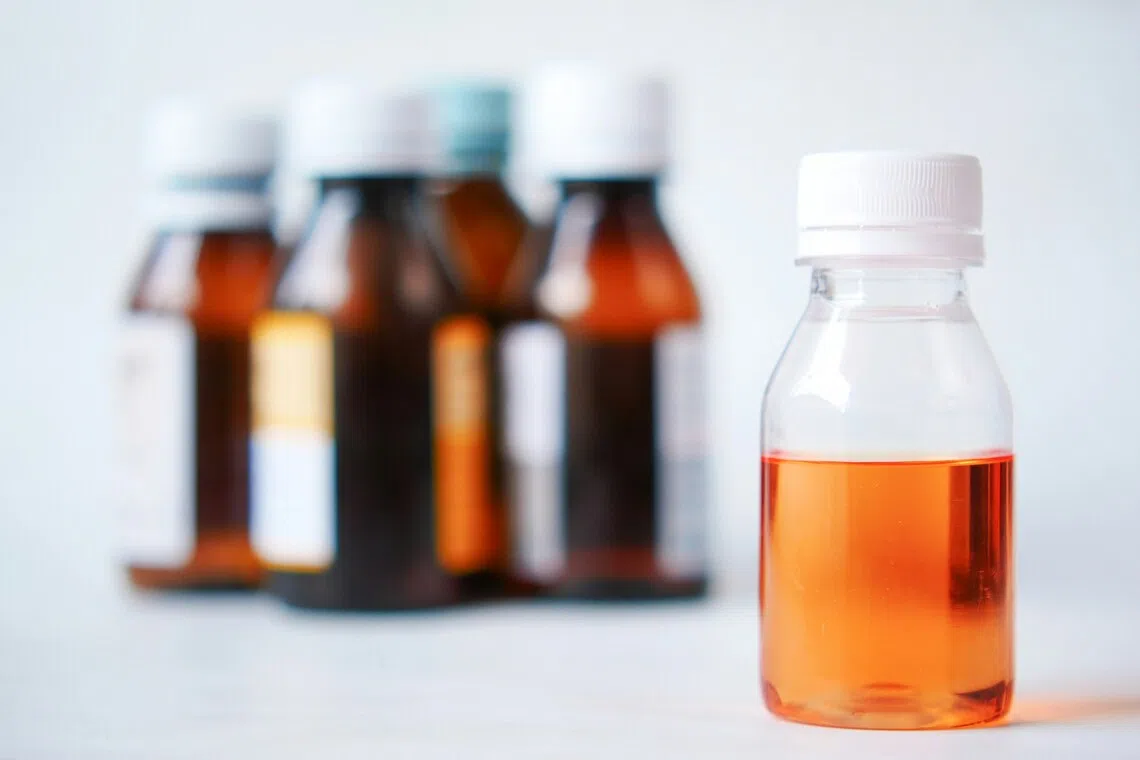Police launch manslaughter probe into India’s cough syrup deaths
Sign up now: Get ST's newsletters delivered to your inbox

A criminal case has been registered against manufacturer Sresan Pharma and a doctor who prescribed the medication.
PHOTO ILLUSTRATION: UNSPLASH
Follow topic:
NEW DELHI – Indian police have opened a manslaughter probe against a maker of cough syrup whose product was found to contain dangerous levels of a toxic chemical, after the deaths of 14 children suspected to have consumed contaminated medicine.
Most of the children were under the age of five and died of kidney failure in the past month after consuming the cough medicine branded Coldrif Syrup.
A sample of the syrup among 19 medicines tested after the deaths in Madhya Pradesh state contained 46.28 per cent diethylene glycol, far exceeding a permitted level of 0.1 per cent, a state drug laboratory said in a report seen by Reuters.
“The doctor who wrote the prescription has been arrested,” Mr Rajendra Shukla, the deputy chief minister of Madhya Pradesh, told news agency ANI.
Diethylene glycol or ethylene glycol toxins were found in Indian-made cough syrups that have killed at least 141 children in Gambia, Uzbekistan and Cameroon since 2022, and another 12 children in India in 2019, damaging the image of the world’s third-biggest drug-manufacturing country by volume.
Police registered a criminal case on Oct 5 against the doctor and the manufacturer, Sresan Pharma, located in southern Tamil Nadu state.
“All the children had early symptoms of common cold, flu or fever, and most were under the age of five,” said the police complaint in the central state of Madhya Pradesh. “Most of them were given Coldrif syrup, following which they suffered from urine retention and acute kidney disorder.”
Diethylene glycol, used in products from antifreeze to cosmetics to lubricants, causes symptoms that the World Health Organisation says may range from vomiting and abdominal pain to acute kidney injury, which can cause death.
Sresan Pharma faces accusations of culpable homicide not amounting to murder, adulteration of drugs, and manufacturing, selling, or distributing cosmetics in violation of the Drugs and Cosmetics Act.
Regulatory action has also been taken against a unit of the company, said the Health Ministry, without giving details, and the Central Drugs Standard Control Organisation recommended cancellation of its manufacturing licence.
Sresan Pharma did not immediately respond to a Reuters request for comment. If convicted, the firm and its officials could face fines and jail terms of up to life.
The contaminated batch of cough syrup was distributed only within India, according to a document seen by Reuters, so it falls outside the scope of a 2023 rule for tests on exports to make sure the impugned chemical is within prescribed limits.
Other states bordering Madhya Pradesh, such as northern Uttar Pradesh and western Rajasthan, have also banned the syrup.
The Health Ministry has called for the “rational use” of cough syrups for children, recommending “judicious prescribing and dispensing” in an advisory, saying most illnesses causing coughs clear up without use of drugs.
India’s pharmaceutical industry, exceeded in size only by the US and China, is valued at US$50 billion (S$64 billion). More than half of its value comes from exports, according to government data, with costs of manufacturing in India up to 35 per cent less than the US and Europe.
India supplies 40 per cent of generic medicines used in the US, 25 per cent of all those used in Britain, and more than 90 per cent of all medicines in many African nations, its drug regulator says.
Since 2023 and following the overseas deaths, India made it mandatory for syrups to be tested at government-approved labs before export, though the same rule does not apply to locally sold products.
Cough and cold syrups are mostly made with solvent propylene glycol, which is generally sold in two grades: pharmaceutical and industrial. The industrial grade is widely used in liquid detergents, antifreeze, paints or coatings and is always cheaper than the pharmaceutical version.
This is partly because it is not intended for human consumption and may contain more toxins. Reuters has reported how, in the past, industrial propylene glycol may have been used to make cough syrups.
“Cough medications have minimal proven benefit in children but carry significant risks,” the Health Ministry said in a statement. REUTERS

